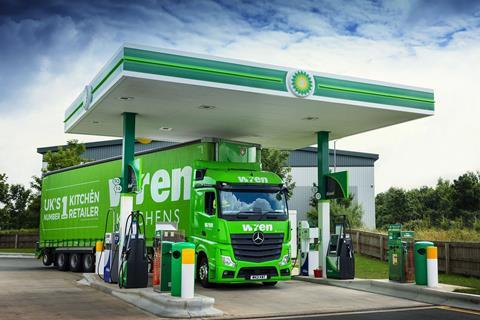- New research from BP shows that HGV fleets are keen to decarbonise, but the availability of alternative fuels may stand in their way.
- 60% of fleet managers think decarbonising their HGV fleets within the next five to 10 years is a realistic goal, according to BP data.
- Brand image (72%) and limiting impact on the environment (67%) are the biggest motivators.
- However, the cost of vehicles (69%) and concerns about the availability of alternative fuels (53%) are the biggest obstacles to decarbonisation.

Fleet managers are under increasing pressure from customers, company investors and governments to reduce the carbon emissions of their HGV fleets, according to new research commissioned by BP.
The research marks the launch of Keep on Trucking, a new campaign to support HGV fleets with decarbonisation, part of BP’s overall plans to help support the electrification of fleets. The company is also planning a network of dedicated hubs for HGVs that will offer a selection of fuelling options, as well as better facilities for drivers.
The research revealed that 82% of fleet managers surveyed think decarbonisation is a positive move for their business. Over half (53%) of HGV fleet managers polled say that they’ve already started to decarbonise their fleet in some way, indicating that the transition is well underway already.
As well as pressure from the government, the biggest motivators for truck fleets to decarbonise include improving brand image (72%), reducing the impact of an HGV fleet on the environment (67%) and future-proofing their business (58%).
However, there are still barriers to contend with: 53% of those HGV fleet managers intending to decarbonise their fleets are concerned about the availability of alternative fuels like renewable diesel, and 42% by issues around recharging electric trucks during long-haul journeys.
Adrian Brabazon, head of UK Fleet Solutions at BP, said: “It’s encouraging to see that many HGV fleet managers are feeling positive about decarbonisation. At BP with our integrated approach and strong presence in traditional fuels, EV charging, and bioenergy, we are planning to develop a network of dedicated hubs for HGVs that will offer a selection of fuelling options, as well as better facilities for drivers.
“It’s interesting to see that, based on our research, 86% of fleets are already thinking about introducing electric trucks to their fleet. Earlier this year BP pulse announced its plans for Europe’s first public charging corridor to support electric trucks at key sites along Germany’s busiest road freight routes. This investment marks an important milestone on the road to decarbonisation for trucks.”
He said BP has also made significant investments in alternative ‘transition’ fuels to support truck decarbonisation, including renewable diesel and bio-LNG. In 2021 BP acquired a 29% stake in Gasrec, which today refuels around 40% of the UK’s gas-powered heavy-duty trucks.
































